
Volume XIV, Issue IX
Josiah
By Bob Kirchman
Copyright © 2018, The Kirchman Studio, all rights reserved
Chapter 9: Spoiling the Garden
As Josiah related it to West on Earth, it was not so clear how it started. He began with a bit of background, “You know, we now were ready to create a new evolution of human institutions so we intentionally cast off a lot of the ‘archaic’ rules of the past. Our society became a pragmatic one. We don’t force monogamy, for instance, insisting only that the society as a whole take responsibility for the needs of the children. Well, most of the settlers simply paired off like in the old days. They raised their own kids. They lived quiet lives. But there were some of the APOLLONIUS faction that were not content to stay within the lines. Human jealousy, I’m afraid, is still very real and when a man lies dead and another stands with a bloody stone in his hands asserting his boundaries, the institution’s response is not so clear anymore.”
What did you do next?” West asked.
Well, we don’t believe in capital punishment, so the question was how to deal with the crime. The killer was simply restricted to his portion of the greenhouse and was informed that if he ventured forth he would simply be forcibly returned. It was an answer, but it was not a good one. Over the years you can see the tension between his people and the people of the victim. Our society, I fear, is a very fearful and unsettled one at the moment. I’m beginning to wonder if we can actually achieve the vision APOLLONIUS left us with and I don’t say that lightly. Mr. West.”
So, should we begin to evacuate you? We can only move ten out in the transport that just landed, but we can send others. We can resupply the colony as we gradually get you home.”
But there are those who see this as home, and the life they’ve fled so wretched, that I believe they will not come.”
Think about it, Josiah, and we will formulate a plan for your evacuation and reassimilation.”
I will discuss it with the Counsel.”
(to be continued)
The Tomorrowland Problem
Study for a Fictitious Future Road
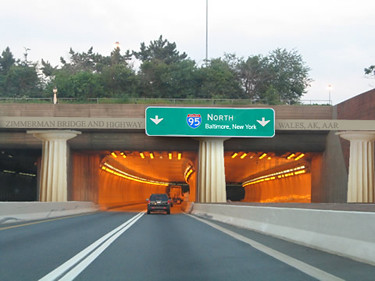
Classical columns mark the entrance to this Tunnel. [click to view]. Here is a graphic of a possible project by Zimmerman Bridge and Highway to complete a 'gap' in the United States Interstate System. Graphic by Bob Kirchman.
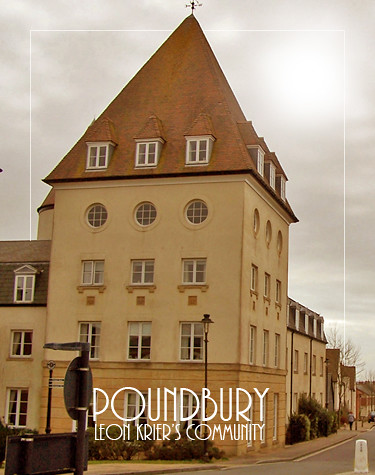
Leon Krier's 'City of Tomorrow'
Building on the Past
Poundbury, Leon Krier's Future City
Poundbury is based on some of the timeless principles that have enabled many places around Britain to endure and thrive over the centuries. It is a high density urban quarter of Dorchester which gives priority to people, rather than cars, and where commercial buildings are mixed with residential areas, shops and leisure facilities to create a walkable community. The result is an attractive and pleasing place, in keeping with the character of Dorchester, in which people live, work, shop and play. Commissioned by the Prince of Wales and designed by Leon Krier, Poundbury offers a vision for the future returning to a more human scale in its design. Therefore, Poundbury, in its mission, overcomes the ‘Tomorrowland Problem’ by specifying an architecture that transcends a small contemporary period. In many ways it creates a timeless place for its inhabitants. Even more important, the people love it.
An economic assessment completed by Dorset County Council has concluded that the Poundbury development has already contributed over £330million in demand for goods and services to the local economy and will contribute a further £500million by 2025. Poundbury is an urban extension to the Dorset county town of Dorchester, built on Duchy of Cornwall land, according to timeless principles of architecture and urban planning as advocated by HRH The Prince of Wales. It is currently home to 1,500 people in different types of housing, including social housing, as well as providing employment for some 1,000 people. The report estimates that the construction activity that has taken place in Poundbury since 1994, when the development began, has created the equivalent of 1,877 person-years in employment and 1,049 business-years of work for firms including the self-employed. These figures will grow over the next 15 years as the development is completed. The assessment indicates that when Poundbury is completed it will be supporting over 430 new full-time equivalent jobs and 121 new businesses in the local area on a long-term basis. This means a contribution of around £40million per annum in increased demand for local goods and services and a net equivalent of about £20million per annum added to the local economy.
Simon Conibear, Poundbury Development Manager said: “We have always been aware that Poundbury has been a major source of employment and economic activity, for Dorchester particularly, but it is interesting to have this quantified. The important thing is the legacy we leave, and it is encouraging that even after construction activity ceases in 15 years time, there will be a continuing major economic benefit to the Dorset sub-region.”Anne Gray of Dorset County Council said: “Poundbury has already had a positive economic impact and there is more to come. A long-lived project such as this is really important to the area both throughout the construction phase and in terms of the permanent impacts which will be felt in the sub-region.”
Over the course of the development, Poundbury is expected to increase the population of Dorchester by about one-quarter, by approximately 5,000 people. By early 2010, there were 931 completed dwellings, with more than 25 per cent social housing, and a population of around 1,820 . More than 1,100 people were employed in businesses located at Poundbury. Poundbury is now more than a third built with plans for 2,466 homes by 2025. Poundbury has proved increasingly influential, attracting international interest and generating hundreds of organised tours every year from architects, town planners and others. The success of Poundbury has now been recognised far beyond Dorset and many of the principles have been incorporated into the Government’s Planning Guidance Note (PPG3). Poundbury was also highlighted as an exemplar in “Living Working Countryside. The Taylor Review of Rural Economy and Affordable Housing” a report by Matthew Taylor MP, published in July 2008 and commissioned by the Government.
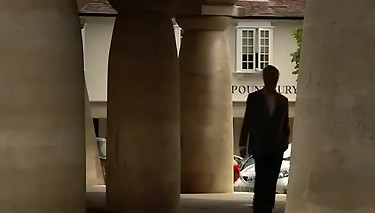
Human-scaled Poundsbury.
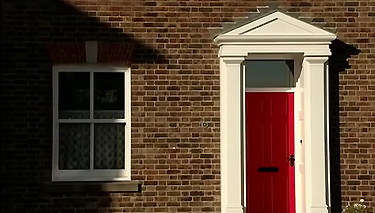

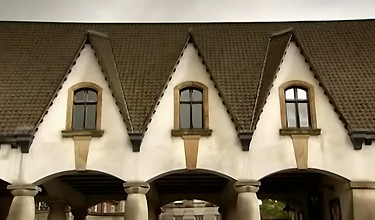
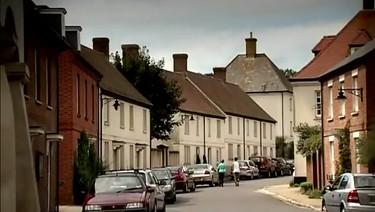
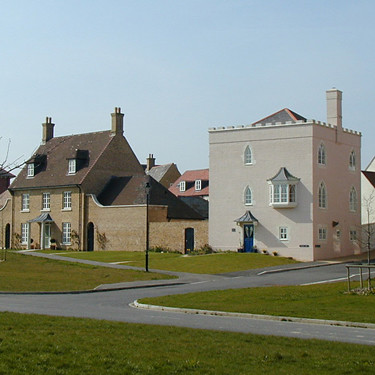
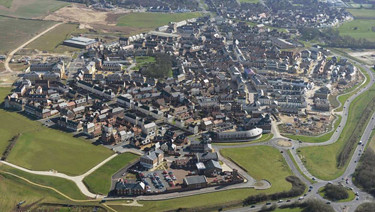
A Royal Revolution
Is Prince Charles’s Poundbury Vision Having Last Laugh
[click to read]
In a room of raw concrete block walls and exposed steel beams, a man with a long hipster beard takes an order on his iPad and froths up a flat white. Young mums and retired couples sit at long communal tables among Wi-Fi workers. It could be a trendy east London cafe in a repurposed industrial space, but this is the centre of Poundbury, the Prince of Wales’s traditionalist model village in Dorset. And there’s not a doily or tweed jacket in sight. (read more)
Loving the Arab and the Israeli
A Loving Understanding of the Middle East's Peoples
[click to read]
Two narratives exist today in Christendom about the Middle-East. Depending on your church affiliation, you may hear one or the other. If you attend a mainline Presbyterian Church, say in the PCUSA, you are likely to hear a narrative such as this: “The poor Palestinians have been oppressed by the Jewish ‘occupiers’ of their homeland.” In that point of view, the Palestinians are the victims, the state of Israel is a ‘modern invention’ and has nothing to do with the work of God today. Visit a more Evangelical branch of the church and you may find what seems quite the opposite, a devotion to the modern state of Israel as fulfillment of Prophecy. In this scenario the Arab population often seems to be portrayed as the villain. So, you ask, “Who is ‘right?’” Michael Onifer and Joshua Charles take on this complex and often confusing question in their book: God, Israel and You. Rather than present a pre-selected narrative and plug in Scripture to affirm it, the authors approach the subject with a very open study of history and Scripture, acknowledging the warts and wrinkles. You will emerge from this book loving the Arab people. You will emerge from this book loving the Jew. (read more)
On Calling and IMAGO DEI
Discerning the Strokes of the Master
O Master Maker! Thy exultant art
Goes forth in making makers.”
—George MacDonald
If George MacDonald is correct in asserting that all wickedness tends to destroy individuality, then the Christian should have more individuality than anyone else. Purged of the encumbering weight of the wicked self and knighted by the accolade of the All-Sufficient, he should demonstrate daily the abundance that is repeatedly declared to be in Christ. Macdonald says of the white stone with the new name in the Book of Revelation that it is given because it expresses “the character, the nature, the meaning of the person who bears it. It is the man’s own symbol—his soul’s picture, in a word—the sign which belongs to him and no one else.” The great Creator Artist wants to render not only a Christian in His image but at the same time produce a portrait of the real qua man (for it is man and not the angels who are saves) relieved of the debilitation and devilish self.
Among devoted young Christians seeking the fullest possible service of God, the personality is frequently weighed in precisely the wrong manner, or perhaps we should say ignored. Urged to “empty the self” and submit to God’s consuming fire their most prized possession, they sometimes tragically withdraw from the very talent that God has uniquely given. This in part accounts for the number of failures in Christian service. It is as if a man with obvious talents—let us say in bridge building—should convince himself that bridge building is the one thing not to undertake but rather that he must become a poet. Christian young people ask with a soul-stirring devotion to God, what shall I do with my life? And are told in effect to become a missionary, become a minister, or become a Christian businessman or housewife. What a tragic dearth of imagination. Not, of course, that there is not room for a great variety in these categories, but that the method itself is constrictive.
One suggestion is that we spend less time telling young Christians and more inquiring of them with a view of entering, and having them honestly enter, the crepuscular (dim) world of their motives and talents. Then we need to remind young people often that patterning their life after another—a common practice in all men—has some advantages and other decided disadvantages. I had the privilege of talking with Grandma Moses, the primitive painter, and she told me her agents disliked for her to go down to New York City and particularly for her to go to art galleries. They were afraid she would lose the delightful naiveté which makes up her native genius. Young people should be similarly cautioned to look for God-given uniqueness in themselves and when discovered (and I feel there is much more of it than now appears) warned to guard and cherish it.”
—Clyde S. Kilby, Arts and the Christian Imagination
A Little Inconvenient History
by George, from WashingtonsBlog [2.]
[click to read]
George writes: “I was raised to be against guns. My parents hated guns, and believed that they only lead to crime and accidental shootings. I was raised in a blue state, and I have long been deeply influenced by leading voices for non-violence, such as Gandhi and King. So – until recently – I was pro gun-control. As such, I was stunned to learn about the historical background behind gun control campaigns.” (read more)
Well Done
Good and Faithful Servant
Someday you will read or hear that Billy Graham is dead. Don’t you believe a word of it. I shall be more alive than I am now. I will just have changed my address. I will have gone into the presence of God.”
At 99 years of age, Billy Graham has stepped into the presence of the Lord. He has heard the words: “Well done, good and faithful servant!” from the Master’s lips. I do not think it is coincidental that the great man has left us at this time. Remembering the Spirit that drove his life is exactly what we need right now.
Our world is a mess. We have serious problems. No amount of brilliant engineering or institutional solutionism will renew the human heart. Graham’s life work was bringing people to God. God changed the hearts. In Graham’s heyday, secular society at least nodded to the positive influence of Faith. Today the hosts of a major network TV show call Vice President Pence’s devotion to his Faith a “mental illness.” The secular academy largely promotes that notion as well – and yet, when we breathe our last or face challenges beyond our comprehension, that academy and that popular culture fails us. All they can offer us is comfort in accepting the present. They can offer us no life beyond this one and they can offer us no help beyond our own strained resources.
Graham ministered to a succession of Presidents. The leaders who had to forge earthly solutions looked to the friendship of a man who’s citizenship was Heavenly. The fact that Graham was a trusted friend to so many Presidents says volumes about the true stature of a man of Faith in the halls of power. Like Pence, Graham made sure his dealings with women were above reproach. It is said that when Graham travelled he was never alone. Upon entering his hotel, his aides would enter his room first lest someone be hiding there with the intention of creating a sordid story. He knew the stories of other men’s fallings and did not think himself better than them. Rather, he made sure his life on the road was an open book.
He considered himself a simple preacher of the Gospel and usually avoided political issues. Still, in the days of Watergate, he was sharply criticized for standing by his friend Richard Nixon. He clearly taught the Scriptures and in that way he did indeed comment on the issues of his day. His son Franklin is more direct in applying those same Scriptures to the issues of our day, but this is a different time and we perhaps need that directness as popular culture and the academy seek to deny the power of Divine Principle. Thankfully Reverend Graham’s passing gives us as a people the opportunity to look at the great gift that Faith is to us – and that most Americans still acknowledge. I see a race…
It is a relay. The baton has been passed. It has not been passed to Franklin, but to us. Each one of us is called to run our ‘Anchor Lap’ in this great race. Before Billy Graham ran his lap, there was Paul. He put it this way: “Brethren, I count not myself to have apprehended: but this one thing I do, forgetting those things which are behind, and reaching forth unto those things which are before, I press toward the mark for the prize of the high calling of God in Christ Jesus.” – Phillipians 3:13,14
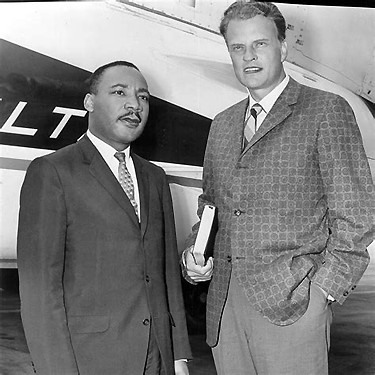
Martin Luther King and Billy Graham.
“Removing the Ropes of Racism”
Billy Graham Integrated Crusades in the 1950s
In 1957 the Reverend Billy Graham invited Dr. Martin Luther King to pray at his 1957 Crusade and later to speak at a ministry retreat to help his staff better understand America’s racial divide. In the 1950’s Graham insisted that his crusades be integrated. It was often customary to divide audiences comprised of black and white people with a rope. Graham removed the rope. He made it quite clear that we were equal before God and that at a Billy Graham Crusade, that meant equal access.
We must remember that this was the America of the South, struggling out of its Jim Crow past toward Civil Rights, Massive Resistance and Affirmative Action. In such context, Graham’s friendship with Dr. King can be seen as a true step forward. Modern observers say Graham didn’t go far enough. In the 1960s he personally bailed King out of prison but did not join him in his Washington rally. In retrospect Graham himself lamented “missing the mark” here.
He chose to focus on his work of evangelism, feeling that true reform would spring forth out of true revival. While his son Franklin is often criticized for political involvement, his father is criticized for holding back. I think it is clear that Billy Graham felt the causes were important though. When he went to South Africa, he insisted the crusades be integrated their as well. It was but a beginning. The great task of true reconciliation has become ours, but Billy Graham showed us how to take the first steps.
